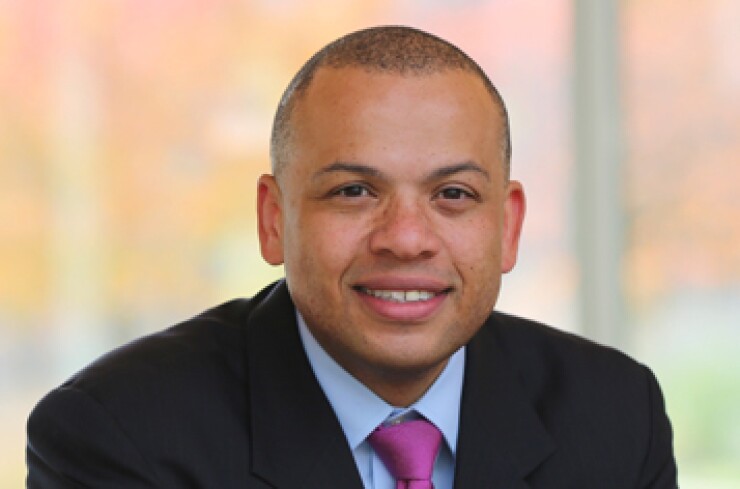WASHINGTON — Pension funds need more state support to create a viable environment for public-private partnerships that could become good long-term investments for the funds while helping to close the infrastructure funding gap.
With the national infrastructure deficit expanding and a long-term federal funding bill not yet on the table, pension funds are increasingly seen as one mechanism to help bridge that funding gap.
Chicago and other cities will likely invest in an infrastructure fund, but to make it happen, they need public leaders to step up, said Kurt Summers, Chicago's city treasurer.
“In order for that infrastructure fund to actually have investments that make sense, there has to be forward-thinking public entities and public leaders that are willing to take on those partnerships around the country,” Summers said.

State officials also need to change mandates to encourage investment in infrastructure. An infrastructure mandate should be in every pension fund's investment policy and most states don’t have a mandate for public pension funds to invest in infrastructure, Summers said.
“If states wanted to further open up the investment into infrastructure from pension funds then they should look at making those mandates clear in state law for the investment policy for pension funds that have a specific allocation to local investments and a specific allocation to infrastructure,” Summers said.
In Illinois, pension funds are required to report on what the local impact of their investment is, encouraging investments overall, Summers said.
“If states were committed to catalyzing infrastructure investment and they wanted the pensions plans to be a part of that investment, a great way to do so would be to create those mandates at the legislative level,” he said.
On the federal level, Rep. John Yarmuth, D-Ky.,
The $300 billion in 40-year bonds would be sold by the federal government at a two percentage point premium over Treasuries for purchase by only pension funds to help them reduce their underfunding problems. The bonds would have to be held at a minimum for 10 years.
The idea of getting a Treasury guarantee could be appealing to pension funds, said Les Richmond, Build America Mutual’s vice president and actuary.
“In these Rebuild America bonds, it seems like you could lower your overall risk profile of your pension fund, which that could be an appealing thing,” Richmond said. “If you’re not necessarily looking to achieve with every investment a super high return and you’re just trying to lower your volatility in your pension fund, this could be a viable investment.”
Overall, pension funds are looking to maximize their returns and something on the federal level could be done to improve returns on privately issued bonds as opposed to Treasury- issued bonds, Richmond said.
“Perhaps a federal guarantee on a couple of privately issued bonds to finance infrastructure because pension funds might be interested in something that would decrease the risk of their portfolio,” Richmond said. “So it doesn’t have to necessarily be a Treasury-issued bond, it could be a privately issued bond that has a federal guarantee on top of it.”
The Los Angeles County Employees Retirement Association said it would be considering private infrastructure investments globally, adding there were “significant opportunities” that were independent of U.S. policy changes. Currently, its longer-term allocation policy weight to infrastructure is 3% of its total fund.
“If the US policies change to make more domestic infrastructure investments more attractive to institutional investors or increase the number of viable domestic infrastructure projects, we would expect those changes to be reflected in the opportunity set of possible investments for LACERA in this category,” wrote Jim Rice, LACERA senior investment officer, in an email.
The North Carolina Retirement Fund said it doesn’t have a policy point of view, said Frank Lester, spokesperson for the state’s treasurer’s office.
“However, we try avoid investments that require a favorable regulatory environment or major changes to the existing regulatory environment to work,” Lester wrote in an email.
Summers noted that pension funds need more entrance into investing in infrastructure, noting that a smaller field of asset managers are in the space relative to other asset classes.
“In general I think that infrastructure as an asset class in the U.S. is still maturing,” Summers said.
Besides needing more asset managers in the space, Summers said they need more open-end options. Open-ended funds give pension funds the cash flow they need, while closed-end funds act like a private equity fund, with no ability to pull money out until the fund is closed, Summers said.
Pension funds are looking for assets that have a long duration and generate a steady yield, said Clive Lipshitz, a managing partner at Tradewind Interstate Advisors. However, pension funds have limited options when it comes to investing in open-end funds.
“It’s a supply-demand problem. So basically if you look at all the infrastructure fund managers out there, most of what they offer is these finite 10 to 12 years,” Lipshitz said.
Infrastructure and pensions could benefit each other through asset transfers, creating a way to solve Illinois' underfunded pension crisis, Summers said.
In an asset transfer, a public asset would be transferred from one form of ownership to another, but be kept in public hands, Summers said.
He added that revenues from its public assets are already being siphoned to support pension payments anyways, so asset transfer could keep it all in the same place. Water and sewer rate increases pay for pension payments in Chicago, but with an asset transfer, all of the revenue could go directly into the pension plan.
Bond issuance would still be key if asset transfers pick up steam, Summers said and added that they could be tax-exempt since it would involve a public asset.
Leaders such as Chicago's newly elected mayor, Lori Lightfoot, should consider asset transfers in the city's future, he said.
“It could happen at the state level, it could also happen at the municipal level,” Summers said. “Our new mayor-elect should be looking at this same opportunity for Chicago’s pension plan.”





